JWF Fund 2018
Japan Water Forum (JWF) Fund managed through fees from corporate and individual members and donations is the initiative that supports grass-roots organizations to address water-related issues in developing countries. 2018 is the 14th year since its establishment in 2005.
In the JWF fund 2018, we have received 408 applications from 41 countries.
As the result of selection, we have decided to provide funds for 7 projects from 5 countries.
Outline of the application
Application Period: 1 June to 6 p.m. 31 July
Number of the Applicants: 408 projects from 41 countries
Selected projects: 7 projects from 5 countries; Sierra Leone (1), Lao PDR (1), Malawi (2), Uganda (2) and DR Congo (1)
The projects were selected and decided among 408 applications by screening of JWF staffs.
Recipients of JWF Fund 2018
1.Good Sanitation Facility is Life (Construction of 2 Pit Latrines and Good hygiene practice education in 2 Schools) (Sierra Leone)
Outline of the project
・Organization: Economic Empowerment and Human Rights Sierra Leone (EEHRSL) (#130)
・Country/Area: Sierra Leone/ Bombali District
・Project period: October 2018 to February 2019
・Number of expected beneficiaries (Direct): 582 people (256 Girls, 312 Boys, 10 Female teachers and 4 Male teachers)
・Cost: 2,154USD (JWF Fund 1,000 USD, contribution from beneficiaries 3000 USD and contribution from EEHRSL 854 USD)
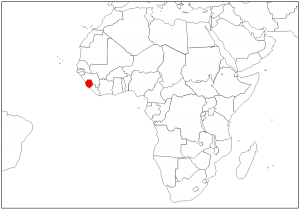 |
|
Sierra Leone |
Background
Lack of sanitation facility and hygiene education are big problems in schools of rural communities in Sierra Leone. There are no latrines in 2 targeting primary schools and these primary schools have the population of 568 pupils. The pupils defecated behind their school, whereby domestic animals such as dogs, ducks and fowls feed on this defecation. Girls are unwilling to defecate in open places, therefore they do not want to go to school. It makes many girls dropped out of school.
According to the EEHRSL Resent research conducted and District Health Management Team’s estimations, about 1/7 of the population in Sierra Leone still openly defecates in the absence of any toilet/latrine, of which 75% lives in deprived rural communities. Fecal pollution is a real issue since polluted drinking water causes water borne diseases such as viral gastroenteritis, viral hepatitis, typhoid, cholera epidemics, diarrhea and so on. As a result, primary school pupils and people in the communities are exposed to those water-borne diseases.
Contents of the project
Engagement meeting with community stakeholders, Construction of 2 VIP (Ventilated Improved Pit) latrines and hand washing facilities, 2 Training workshops on good sanitation and hygiene management, 3 campaigns on sanitation and hygiene
Current situation of the project site
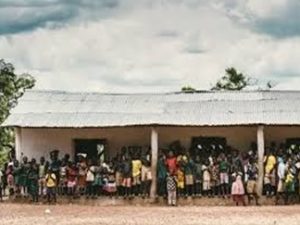 |
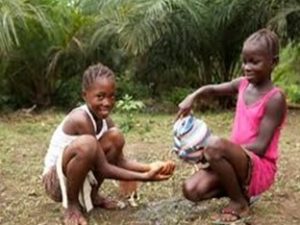 |
| One of the target school with pupils | Pupils defecating in the bush close to the school |
2.Water supply improvement in rural village of Ban Paen, Phoukout District, Xiengkhouang Province, Laos (Lao PDR)
Outline of the project
・Organization: Ban Paen Environmental Protection and Development Group (BPE) (#133)
・Country/Area: Lao People’s Democratic Republic/Xiengkhouang Province
・Project period: October 2018 to February 2019
・Number of expected beneficiaries (Direct): 189 people (65 women, 50 men and 74 children)
・Cost: 4,000 USD (JWF Fund 1,000 USD, beneficiaries 1,500 USD and BPE 1,500 USD)
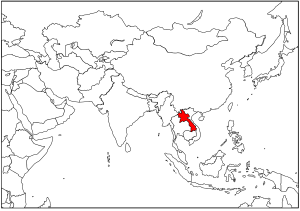 |
|
Lao PDR |
Background
Ban Paen Village comprises of 125 households and has over 600 residents. The village is relatively dry and water shortage has become norm. To solve the water issue, 3 small water pipeline projects for the village have been developed with funding from the USAID and UNDP in 2010.
However, because of climate change, water flow through the pipelines decreases while population in the village rising. In addition, a pipeline was broken and some parts were deliberately destroyed by someone villagers have never known.
As result, a large portion of the village and its primary school have been struggling for water since 2015. Today, even during the monsoon season, there is very little or no water runs through the pipeline. The water shortage has affected everybody in the village, and even little girls must fetch the water from well far away from their families. Worst of all, school kids must bring water from home for washing and cleaning of their toilets at school.
Contents of the project
Consultation with the village and formal approval, Mapping and survey of the project site, Expanding existing water reservoir, Repairing and embedding pipelines
Current situation of the project site
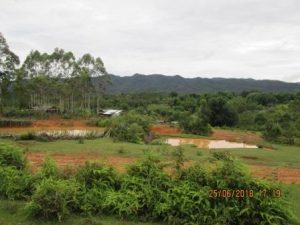 |
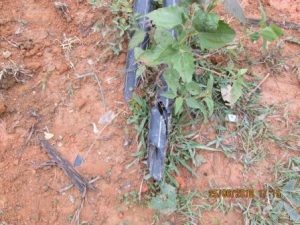 |
| Existing water reservoir | Broken pipeline by someone |
3.Maleule Boreholes Repair Project (Malawi)
Outline of the project
・Organization: Centre for Climate Change and Environment Management (CCCEM) (#172)
・Country/Area: Malawi/Blantyre District
・Project period: October 2018 to February 2019
・Number of expected beneficiaries (Direct): 1,350 people (350 women, 300 men and 700 children)
・Cost: 1,543 USD (JWF Fund 996 USD, beneficiaries 249 USD and CCCEM 298 USD)
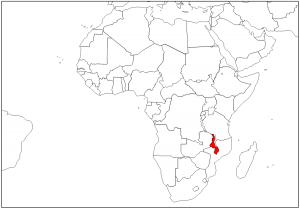 |
|
Malawi |
Background
In the Maleule community, there are five shared boreholes but three out of five are in out operation. When the rids were removed to investigate the status, it was because of lowering water table during the dry season, under influence by climate change. Over 2000 residents thus use the only functioning two shared boreholes, spending their valued time on the queue. People from Chinyonga Village, however, walk a distance of more than five kilometers to draw safe water, as they resigned to stand in a long queue.
Contents of the project
Sensitizing the community, Repair 2 existing boreholes, Maintaining water drains and wash tabs, Establishment of 2 village water committees, Training on operation and maintenance, Training on WASH and fundraising, and Water quality test
Current situation of the project site
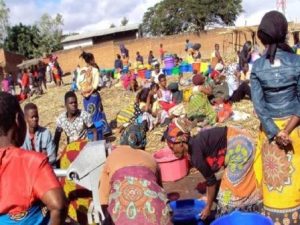 |
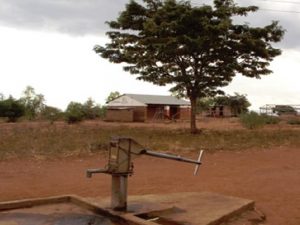 |
| Village people gathering to the borehole to get water | The borehole not working |
4.Construction of water well at Palankhwali area (Malawi)
Outline of the project
・Organization: Friends of Compassion (Fricom) (#372)
・Country/Area: Malawi/Dowa District
・Project period: October 2018 to February 2019
・Number of expected beneficiaries (Direct): 1,051 people (288 women, 353 men and 410 children)
・Cost:2,950.3 USD (JWF Fund 1,000 USD, beneficiaries 710 USD and Fricom 1,240.3 USD)
 |
|
Malawi |
Background
The water problems of the Mpindang’ombe village and the Kawolamwazi village in the Palankhwali area are long distance to access water resources and lack of permanent water resource facility in the community.
People in the villages fetch water from a pond 1.5 km away from the villages and they use the water for drinking, cooking, washing and bathing every day. Sometimes they drink the water without boiling during dry season.
This situation has brought grave consequences in Socio-economic and health components of the population. Health impact includes the case where some adults and children who use water from the pond for drinking purpose are getting sick. This represents annually 25 % of water related diseases among the population of the area, costing about 15% of annual household budget for medical treatment of their family members.
Socio-economic impact is that women and children are spending about 2.5 hours per day to fetch water from long distance. This negatively impacts children’s attendance in school.
Contents of the project
Project meeting with stakeholders, Construction of a hand dug well, Establishment of a water committee, Training on operation and maintenance, Establishment of operation and maintenance framework, Holding community awareness on sanitation, Water quality test
Current situation of the project site
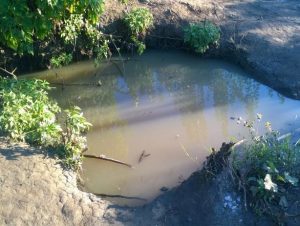 |
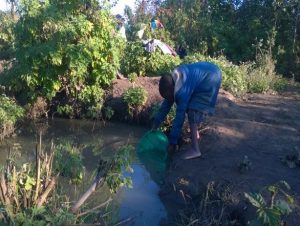 |
| The pond village people using as water resource | Child fetching water from the pond |
5.Construction and protection of Kiwanyi community spring and massive community sensitization on water and sanitation (Uganda)
Outline of the project
・Organization: Kiwanyi health centre-Group (#029)
・Country/Area: Uganda/Iganga District
・Project period: October 2018 to February 2019
・Number of expected beneficiaries (Direct): 3,400 people (1,200 women, 500 men and 1,700 children)
・Cost: 1,400 USD (JWF Fund 790 USD, beneficiaries 230 USD and Kiwanyi health centre-Group 380 USD)
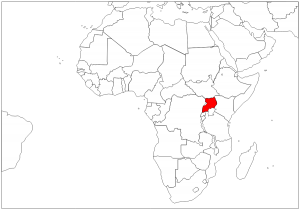 |
|
Uganda |
Background
The people in Kiwanyi Village fetch water from the spring located outside of the village and use it for drinking and other domestic purposes. However, the water resource is unsafe because it is not protected and easy to be contaminated.
When the project team visited the village in April 2018, some sanitation facilities such as latrines, bath shelters and refuse pit were there and used by the village people, excepting hand washing devices in the community.
The Kiwanyi Health Centre’s data shows that one in 6 people experiences diarrhea or skin infection daily, and that one in 26 people also has eye infection in the target village.
Contents of the project
Holding meeting with stakeholders, Construction of a spring protection facility, Conducting 6 community awareness-raising activity on water and sanitation, Training on prevention of water-borne diseases, Establishment of a water users committee, Water quality test
Current situation of the project site
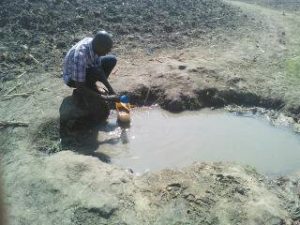 |
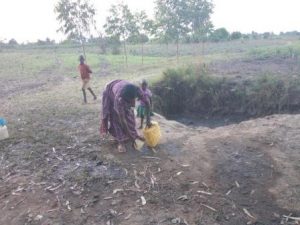 |
|
Village people fetching water from contaminated water source |
|
6.Maintenance of spring wells, awareness on hygiene and training of village women water users in Padolo parish (Uganda)
Outline of the project
・Organization: Community Uplift and Welfare Development (CUWEDE) (#053)
・Country/Area: Uganda/Nebbi District
・Project period: October 2018 to February 2019
・Number of expected beneficiaries (Direct): 800 people (500 women, 150 men and 150 children) 1,500
・Cost: 1,800 USD (JWF Fund 1,000 USD, beneficiaries 30 USD and CUWEDE 500 USD)
 |
|
Uganda |
Background
People living in the Central village and the Oryang village use spring wells in Arimo and Amelenju-Avubu as water source for drinking, cooking, washing, and other domestic uses. However, the facilities are dilapidated, muddy and rusty. In addition to that, poor water handling and maintenance by the users have caused increasing risks of possible water diseases and other diseases such as malaria since such areas could be breeding ground for mosquitos.
For the last four years, these two target villages have recorded the highest number of cases of water borne diseases including especially dysentery, typhoid, hepatitis B, diarrhea, amoebiosis and cholera.
Contents of the project
Repair of the 2 spring wells, 4 awareness meetings for water users, Establishment of operation and maintenance plan, Training on water and sanitation, Water quality test
Current situation of the project site
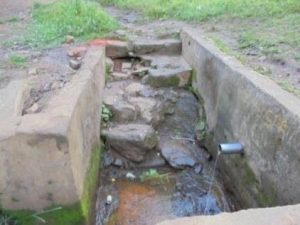 |
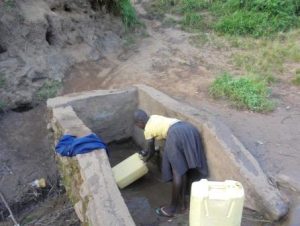 |
| The spring well in Arimo | The spring well in Amelenju-Avubuas |
7.Latrine sauveuse des vies au marché de NGUMA (DR Congo)
Outline of the project
・Organization: Congrès de Jeunes pour la Paix et le Développement (COJEPAD) (#233)
・Country/Area: Democratic Republic of the Congo/ South Kivu province
・Project period: October 2018 to February
・Number of expected beneficiaries (Direct): 316 people (120 women, 111 men and 85 children)
・Cost: 1,497 USD (JWF Fund 1,000 USD, beneficiaries 150 USD and COJEPAD 347 USD)
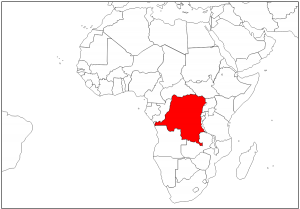 |
| DR Congo |
Background
NGUMA’s twice-weekly market is the only place to supply staples to local people and surrounding villages. The sellers and users of this market suffer from lack of sanitation facilities like latrine. They defecate in the bush without facilities for washing hands. This unruly defecation practice contaminates not only surface of the soil and groundwater, but also goods in the market.
According to the annual report of the Central Office of the Fizi Health Zone 2016, NGUMA is one of the villages where high rate of waterborne diseases has been reported. 49% of the households was affected by outbreak of cholera and the percentage rose to 100% if including other waterborne diseases. 17 people died due to such diseases. Men, women and children from surrounding villages who frequent this market have also been affected.
Contents of the project
Meeting with community people, Construction of 2 pit latrines and a hand washing facility with 4 valves, Cleaning of open defecation site, Awareness sessions on WASH, Establishment of latrine management committee, Training on operation and management
Current situation of the project site
| COJEPAD will provide the photos later | |
(Reported by Akie Gunji, Manager)
